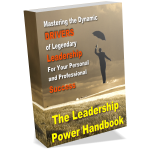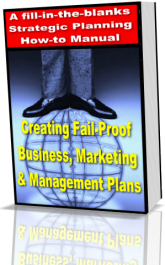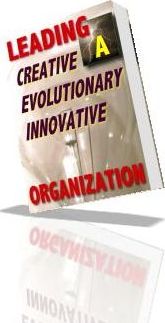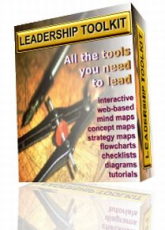Paragons of Knowledge Metazine!
Generating Massive Power
Through
Enlightened Uses of Your Leadership,
Entrepreneurship and
Professionalism!
Syntopic
Intelligence
Knowledge-Work-Skills
The Leadership-Toolkit
Collection
|
An Emotionally Intelligent Workplace Culture: Is it For You?
By: Susan Dunn If as much as 80% of adult success comes from emotional intelligence, what would it be like if your workplace had a culture that fostered emotional intelligence? As much as 80% of adult ‘success’
If as much as 80% of adult success comes from emotional intelligence, what would it be like if your workplace had a culture that fostered emotional intelligence? The Center for Creative Leadership has stated that 75% of careers are derailed for reasons related to emotional competencies, including “inability to handle interpersonal problems; unsatisfactory team leadership during times of difficulty or conflict; or inability to adapt to change or elicit trust.”
If emotional intelligence is this important to the functioning of an individual, what would happen if you established a workplace culture of emotional intelligence?
A BUSINESS CULTURE … a SOUL
What is the culture of an organization?
In “The Soul of an Organization: Understanding the Values that Drive Successful Corporate Cultures,” Richard S. Gallagher states that a business culture is … “your values and beliefs … generally unspoken … your style … the types of people you hire … what behaviors you reward.”
And what is it not? “Your products and services … promoted externally … your policies and procedures … your recruiting process … what behaviors you want.”
You’ll see within these definitions, intentionality - a high-level emotional intelligence competency.
Intentionality means saying what you mean and meaning what you say, staying focused until a goal is achieved, and being accountable to yourself for your motives.
Daily I talk with clients who’ve left a company because of its culture. Here are some examples:
It says in the P&P manual “no nepotism,” and then he hired his wife. It was the principal of the thing. I couldn’t figure out why he turned against me like that. I doubled the annual fund drive. The comptroller said it was because I was too good. I became a threat. So if I’d done my job poorly I’d’ve gotten a raise? All the woman next to me did was complain and gossip, and she got the promotion. Don’t they know what’s going on? One person violated Internet usage so the whole department got punished. Why didn’t they just fire her? Paul was a hard-worker. He kept his nose to the grindstone and he was well liked. Allen whined that he was overworked. By the end everything went to Paul but Allen got the raise. They say they want X, Y and Z, but they reward something totally different. They started hiring the kind of people I don’t want to be associated with. I began to wonder what I was doing there.
These individuals were all high-functioning, but eventually they couldn’t stand the discord of working in a corporate culture than went against their own values or their own stated ones.
Retention of good employees is a major concern of any organization. “[Businesses] worry about their production schedules, their deadlines, their competition, and their financing,” says Gallagher, “but they rarely look inward at themselves.” That‘s why most people, when asked, can‘t define their workplace culture. But this intangible, once thought of as “soft,” “may be perhaps the most important factor in the growth and survival of any business,” says Gallagher. “Understand this fact, and you can reach levels of success that are unimaginable for most people.”
HOW DO YOU INSTILL A CULTURE?
As children, we learn our culture from our parents and elders. We learn what we observe more than what we’re told. If your mother tells you to clean your teeth every day, but you don’t see her doing it, you learn to do it only as long as you’re being watched. If your father tells you not to lie, and then you hear him talking about cheating on his income tax, you learn that it’s circumstantial, or that adults can lie, but children can’t, or you learn that your father‘s a hypocrite, and you lose respect for him and quit listening.
Then when we go to school, we learn that culture. I moved every couple of years growing up. I transferred in the middle of 6th grade. In the new school, as soon as the teacher left the room, everyone cheated. I couldn’t believe my eyes. I transferred again for 9th grade. In the new high school, there was “the honor code,“ and I watched to see what happened. No one cheated! Not on tests, not on homework. The difference? Social pressure, expectations, ingrained habit … whatever it is, it works. In situation A, everyone cheated. In situation B, no one did.
AN EQ CULTURE
How would you instill a culture of emotional intelligence? A culture where creativity, flexibility, intentionality, interpersonal skills, empathy, intuition and respect are valued as well as cognitive intelligence, expertise, and special skills?
It starts with information and education. Courses such as The EQ Foundation Course©, available on the Internet, offer every employee a background in emotional intelligence and a common working vocabulary. Assessments, such as the EQ-Map™ can assess the competencies of individuals, and individual coaching can address deficits. A weekly ezine, such as “EQ in the Workplace©” can reinforce learning and immersion. Modeling by key leaders is vital. EQ for Professionals©, on the Internet, helps managers, coaches, trainers and other supervising personnel understand concepts and how to foster them in others.
In addition, individuals learning new EQ skills need a chance to practice these competencies in real-life situations. The EQ Foundation Course© is interactive and is well combined with personal EQ coaching which allows ongoing supportive feedback. Weekly teleconferences or meetings can also allow process learning.
INTENTIONALITY
Intentionality takes maturity and effort. Changing a culture isn’t easy. It takes dedication, information, practice, and consistency. Actions speak louder and last longer than words. As someone said, re: managers, “you’re being watched.” The company culture is reflected in:
Who’s hired, retained and promoted, What behaviors are rewarded and condoned, How meetings are conducted, Whether one standard of behavior applies to management and another to support staff, Whether the CEO manages himself well, with emotional intelligence, or rules by arbitrary executive fiat, If ’best practices’ articles are highlighted and circulated but never practiced, Whether people are shown to be as valued as production schedules, deadlines, competition and financing.
And all of these things must be shown to be consistent over time.
Take an inward look at your organization. What values and beliefs are reflected? What’s your style? What types of people work there? What kinds of behavior are rewarded?
If you like what you see, great. If not, there’s a way to change it, and changing it can definitely affect your bottom line. If you look at what companies succeed and what don’t, you might agree with Gallagher that the company culture is “the most important factor in the growth and survival of any business.”
About the Author
Susan Dunn, The EQ Coach, GLOBAL EQ. Emotional intelligence coaching to enhance all areas of your life - career, relationships, midlife transition, resilience, self-esteem, parenting. EQ Alive! - excellent, accelerated, affordable EQ coach certification. Susan is the author of numerous ebooks, is widely published on the Internet, and a regular speaker for cruise lines. For marketing services go here. |
Article_Home Personal Leadership About Us Earn HUGE 2-Tier Commissions
|
"Knowledge is power. It takes a long time to harness enough power to even talk about it." - Don Juan, speaking in "Journey to Ixtlan: The Lessons of Don Juan", by Carlos Castaneda, 1972
Need Dynamic Drivers?
A Leadership Power Handbook Can Empower You
& Boost Your Effectiveness!
Create Fail-Proof Plans & Achieve Strategic
Alignment!
Develop Breakthrough Plans!
Empower Your Meetings With Productive
Results!
Lead Better Meetings!
Boost Creativity, Innovate and Energize Your Growth!
Your Business Success is based upon your Personal Ability - Energize your Ideas, Sales & Profits with a Personal Leadership Power Package and Create
Success!
Get
Started Today!
All-the-Tools-You-Need-to-Lead & Succeed!
Equip Your
Leadership Today!
Mustard Seed Investments,
Inc.
140 West 29th Street, PMB-161
Pueblo, Colorado 81008
USA
+1-719-544-9949
All text, content and images are
protected by:
Copyright © 2005-2006, Mustard Seed Investments,
Incorporated,
All rights reserved

